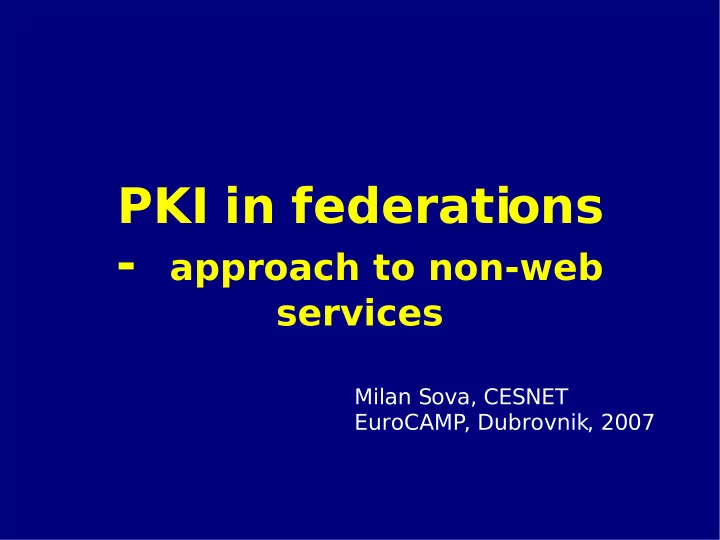

Everything you never wanted to know about PKI in federations - approach to non-web services Milan Sova, CESNET EuroCAMP, Dubrovnik, 2007
SAMLized applications ● HTTPS ● web browser What about ● email access ● network access ● message signing & encryption ● VoIP ● VPN ● ...
Before SAML: X.509 ● CA ... IdP ● AA ... AA ● Relying Parties ... SPs, relying parties ...
X.509 { { Issuer , ... Subject , Statement (PK/Attrs...), ... } Signature }
SAML <saml:Assertion> <saml: Issuer /> <ds: Signature /> <saml: Subject /> <saml: Statement /> ... ... <saml:Assertion>
Why X.509 didn't make it while SAML seems to be succeeding? ● format: binary vs. text ● scope: general vs. specific ● standards: closed vs. open ● community: telcos vs. internet ● assertions: static vs. dynamic ● trust architecture: root vs. peers
Why is X.509 not dead yet? ● ubiquitous code ● long-term signing ● document encryption ● authentication – TLS servers – even (TLS) users!
X.509 issues ● certificate enrollment – identity management ● certificate management – by users ● “private” keys – by the relying parties ● trust anchors ● CRLs – by the infrastructure ● re-keying, modification, revocation... ● PKI's not easy... BUT...
X.509 and federations ● federated CA : certificate enrollment – federated identity – attributes for authorization ● different CAs for different purposes ● an X.509 certificate does not have to be heavy ● an X.509 certificate can be pseudonymous
Possible X.509 applications ● network access ( eduroam ™ ) – EAP/TLS – authenticate devices not users ● VPN – OpenVPN ● SIP? – might work (at least for software clients) ● WebDAV? – why not? - it's just HTTPS
Recommend
More recommend